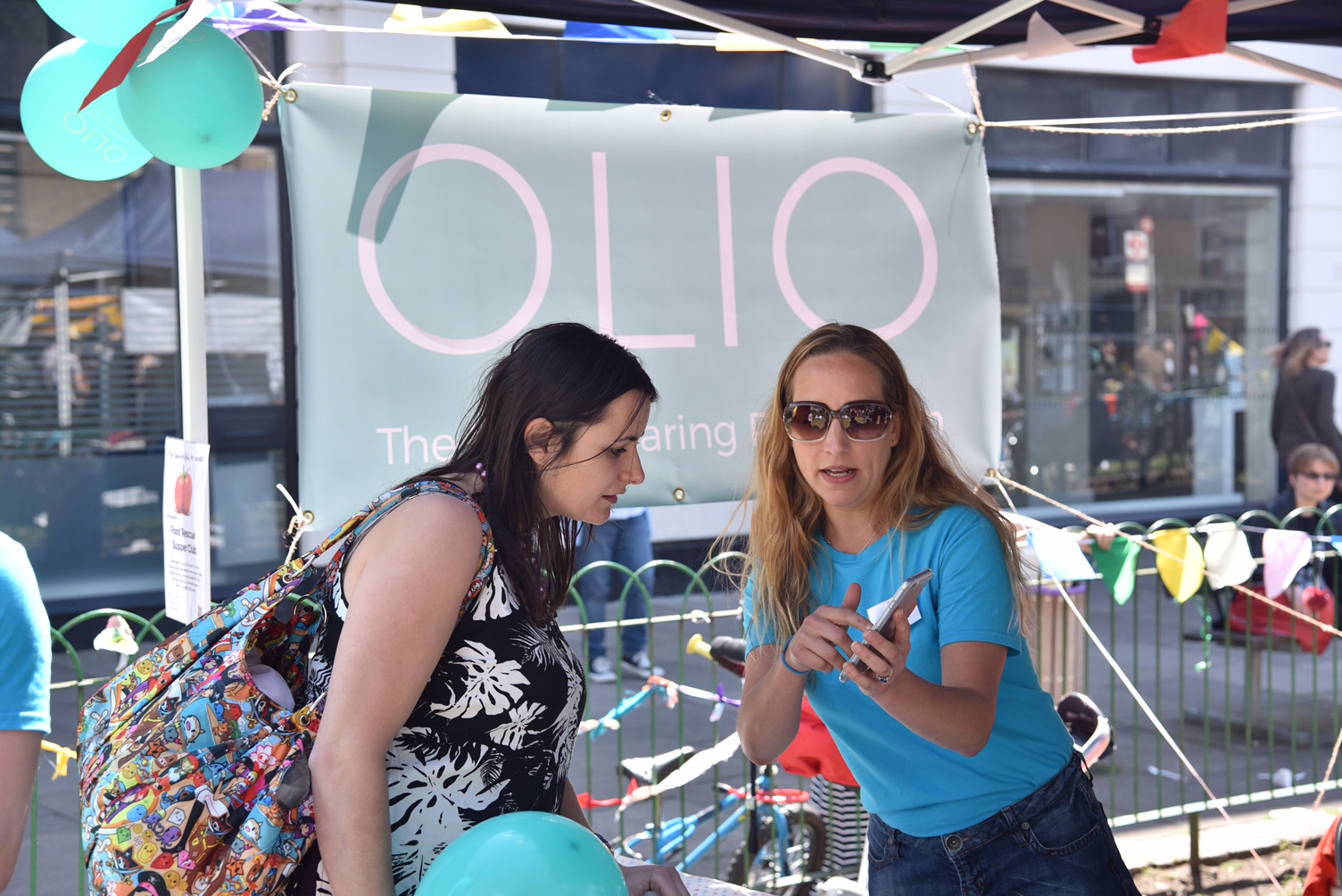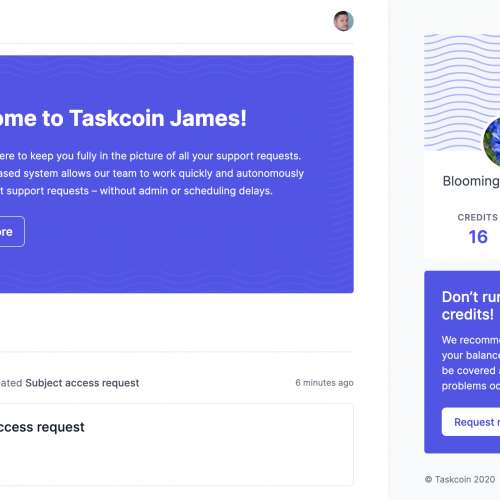If you haven’t heard of OLIO yet, listen up. OLIO is an awesome new, free app that allows users to exchange their extra food instead of wasting it. With 15 million tonnes of food wasted each year in the UK alone, and the average household throwing away £700 worth of unwanted food a year, food waste is clearly an issue we need to be thinking about.
When we first met OLIO founders Saasha Celestial-One and Tessa Cook, they’d done a lot of homework. They knew the problem they were trying to solve inside out, had surveyed potential customers and delved deep into the range of research available around food waste and people’s attitudes towards it.
Between the founders’ commitment to researching their market, and their tireless efforts to bring new users on board, it’s no surprise that OLIO is growing fast. Just one month after launching the iPhone app in Crouch End, London, OLIO is averaging 100 unique users a day and has had 1,000 downloads (around half of which are based in the launch area).
We caught up with Saasha Celestial-One to learn more about how OLIO acquired their first customers, how they’re engaging them and what the plan is next…
Finding users online
With zero budget, Saasha and Tessa have had to spend a lot of time and effort finding users for OLIO. “It’s about finding the relevant places where people in the community talk to each other and building relationships through being a regular participant in the community forums” says Saasha, who has some experience in this area already.
Back in 2014, Saasha helped her father with social media and outreach during his campaign for United States Senator. “It’s quite manual, but it’s a very targeted and effective way to reach people within a given geographical area” says Saasha. “If you don’t have any budget and you want to talk to people, then find the places online where people are hanging out… None of them are really widely advertised so you just need to do your research.”
The trick to actually engaging people online, as opposed to spamming them, is keep it social, targeted and friendly says Saasha. “I’m very careful in all the posts I create as to what’s in it for them as opposed to making it like an advertisement… I always tailor the messages according to the group… just making it relevant so it doesn’t feel like a load of copy paste.”
Signing up new users offline
The other main bulk of traffic and new users for OLIO has come from signing people up face to face. Over the last two months, Saasha and Tessa have been hitting the streets armed with clipboards and flyers to tell people their story and get them signed up for OLIO.

“Most people have this immediate negative reaction to anyone standing there with a clipboard” says Saasha, but she has developed a number of ways to reach out to people. “One is asking ‘do you care about food waste?’ If they say no they’re probably not our target audience anyway…”
Saasha guesses that she’s spoken to around 500 potential new customers in the last two months at farmers’ markets and other local events where people will have the time to stop and chat. She tempts potential users with free food sourced from OLIO and a friendly chat about the food waste problem.
Having face to face conversations is exhausting admits Saasha but she has learned to handle people’s concerns and shape her pitch around them. “I always make it clear I’m not trying to sell anything, I promise it’ll take less than 20 seconds of their time… I promise I will not send you any unsolicited email”. By alleviating the specific concerns she hears in her pitches, Saasha is more able get through to people, and get them to give her a few seconds to chat about OLIO.
Having a network
Saasha is well known in OLIO’s launch area of Crouch End, London thanks mainly to her other local business, MyCreche.
“Of course it was helpful” Sassha says about her reputation in the local area, “but can you replicate that without already being part of a community? Absolutely.”
In the beginning, Saasha and Tessa had no product to show. They needed to reach out to individual people and merchants to help them understand the food waste problem and how an app like OLIO would benefit them. “In the future, we don’t necessarily have to be a part of the community” says Saasha, “because we have a product to share with people, we’re not trying to get them to pre-register for something that may or may not happen.”
Brand ambassadors
It’s not often a business as young as OLIO can count on brand ambassadors, but there are a number of people who have helped OLIO to launch smoothly and are continuing to spread the word.
“Our ambassadors are people who are really excited about OLIO and they want to make sure that OLIO is a success. They’re willing to go the extra mile.” Saasha and Tessa knew they couldn’t launch an empty app, that they needed to source food to post on OLIO before they started bringing on new users. “If we had sent an email to 500 people to download the app and they opened it up there wouldn’t be anything there. Step one was to ask our ambassadors to add something and step two was to email the people who had signed up.”
So how does a company as young as OLIO get brand ambassadors? Before we started building the app, Saasha and Tessa set up a WhatApp group to test the initial mechanism behind OLIO. Almost all of the 12 trial participants have come on board as ambassadors. Saasha has reached out to the keenest supporters of OLIO on social networks and has been approached by people who want to be on board and it’s these people that make up the rest of the ambassador team.
Recently, Saasha was approached by someone from outside of the launch area, who is keen to bring OLIO into her neighbourhood… “I’ve said if you can recruit two other ambassadors and three merchants, and we can get 200 people to sign up… there’s no reason we can’t launch in N2 [postcode] at the end of September… I think ultimately that’s how we’re going to grow.”
Advice for other startups
So how can other startups replicate OLIO’s success? I asked Saasha for her advice… “My number one piece of advice is to do things that do not scale. I have sometimes probably spent the equivalent of half a day on one person or one merchant but they’re really important and it’s really worth it… In the beginning there’s nothing to scale, you can’t do anything that’s scalable unless you’re going to throw money at it. With every incremental person or merchant that joins, the next person is easier to join, because it’s a network. The first person to sign up is going to be the hardest.”
It’s not just about doing things that don’t scale however, you need to take risks and put in effort without knowing what the outcome will be says Saasha… “We did a food rescue dinner in June that required hundreds of hours of work and it was only for 20 people. It ended up being published in the Ham and High [a local newspaper in North London] which got us a ton of exposure… Sometimes I spend a whole day signing people up and I get 12 people and I’m thinking this is not a good use of my time, but it absolutely is.”
“In the very beginning, you shouldn’t be judging yourself by the traditional metrics of an established company with a budget… you have to try as many different things as possible and work as many hours as you have in the day and keep hoping that one of your customer acquisition ideas will scale.”
If you want to join the food sharing revolution, visit OLIOex.com to find out when OLIO will launch in your postcode.



